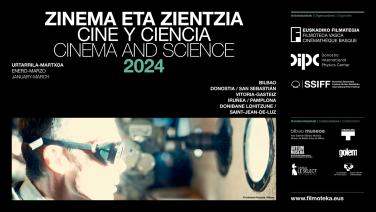
Cinema and science: struggles and dilemmas
The 7th Cinema and Science festival, organised by the Basque Film Archive, Donostia International Physics Centre and the San Sebastian Festival is again stoking up its passion for sharing film and science culture. This season draws on the universality and beauty of film language to spotlight the beauty and depth of scientific thought. A well-known anecdote involving Charles Chaplin and Albert Einstein serves to describe both objectives. When he met Chaplin, Einstein said: “What I admire most about your art is its universality. You do not say a word, and yet the world understands you.” To which Chaplin replied: “But your fame is even greater: The world admires you when nobody understands you.”
Einstein is precisely one of the main characters of Oppenheimer (Christopher Nolan, 2023), a this season’s inaugural film that plunges us into history and the dilemmas that science often poses us. Just like Prometheus, Oppenheimer (and his team) managed to give humankind “atomic fire”, and was later punished for warning about its terrible consequences. Semmelweis, a pioneer of antiseptic procedures, had to struggle against the medical and scientific opinions of his time by researching milk fever to save hundreds of mothers’ lives. The film Semmelweis (1940), recently restored by the Hungarian Film Archive, dates back to the Hungarian period of André de Toth, a filmmaker about whom Scorsese has spoken with great passion. Scientists have and are still studying the Great Rift Valley on account of the animals that live there and because it was where the human species took its first steps: Out of Africa (Sydney Pollack, 1985), based on Isak Dinesen’s novel, is a perfect travel ticket. Plan 75 (Chie Hayakawa, 2022) premiered at the Cannes Film Festival and successfully yet soberly addressed the issue of ageing in society and, therefore, that of our essence as a community. With Bombshell: The Hedy Lamarr Story (Alexandra Dean, 2017) we celebrate the Emakumeak Zientzian initiative through the figure of a classic Hollywood actress whose scientific profile and outstanding role as an inventor had remained in the shadows. This year marks the centenary of the doctor and writer Luis Martín-Santos, and the right time to take another look at the film adaptation of his masterpiece: Tiempo de silencio (Vicente Aranda, 1986). The Perfect Storm (Wolfgang Petersen, 2000) is going to give us the chance to talk about adventures and the weather. There’s no end of reasons to sit in front a big screen and watch Hepburn and Grant in Hawks’ Bringing Up Baby (Howard Hawks,1938), which will also let us to talk about scientific stereotypes. Mars Express (Jérémie Périn, 2023) combines animation and film noir to prompt us to much-needed reflection on artificial intelligence. Finally, the masterful Werner Herzog teams up with a neurobiologist who has been well-acquainted with our season since its very first edition, Rafael Yuste, to travel to the centre of the human mind in Theater of Thought (2022).
So, this year we will be looking at the dilemmas and struggles of scientific communities that are never oblivious to the historical moments that befall them. On the contrary, they often play a leading role in them. Also on the big screen.
